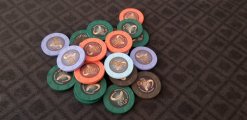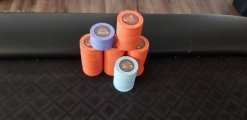One of the biggest things that allows me to feel like I can effectively host and play in a tournament is all about the prep before the game. Things like how many chairs to set out, where I will sit (so I can have easy access to the chips etc..), is the clock and blind levels set correctly…. Etc.
A big element is ensuring there are enough stacks with the proper denominations for players. Trying to count those out when players arrive actually takes a really long time (it seems) and players can get antsy watching all of this happen. Add to that the decks needing to be shuffled, and seat 1 awarded to a player so we know who the dealer is…. I’ve started doing all of that ahead of time so that when players arrive they are registered and given a seat with a stack immediately. When everyone arrives, or when the clock strikes (7pm), the game starts promptly.
Most of the previous comments have already shed light on many good things to consider and focus on, so i’ll just reiterate that anything you expect to do on game night should be considered and practiced beforehand. It’s easy for me to color up, but it’s not so easy for me to calculate a 4 way all-in side pot situation…. so I PRACTICE before everyone arrives, which gives me enough confidence in the heat of the moment to get the results I want (fairness and keep the players happy/having fun). For you, think about what you’re already good at, and start focusing on the things you aren’t good at and make a plan for those things.



